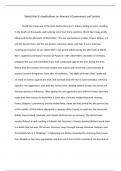World War II’s Implications on America’s Government and Society
World War II was one of the most destructive wars in history, lasting six years, resulting
in the deaths of thousands, and involving more than thirty countries. World War II was greatly
influenced by the aftermath of World War I. The war was between to allies, France, Britian, U.S.,
and the Soviet Union, and the axis powers, Germany, Japan, and Italy. It was a total war,
involving all resources to win. World War II was greatly influenced by the aftermath of World
War I, sparked by Germany’s invasion of Poland in 1939. Adolf Hitler, chancellor of Germany,
instigated this war and committed many evils, particularly against the Jews during this time.
Before their first invasion Germany merged with Austria and moved into Czechoslovakia to
protect Germans living there. Soon after, Kristallnacht, “The Night of Broken Glass” broke out,
an event of violence against the Jews, and Germany took the rest of Czechoslovakia. Germany
signed a “non-aggression” pact with the Soviet Union, dividing eastern Europe into Soviet and
German spheres of influences. After signing the non-aggression pact with the Soviets Germany
made their first invasion in World War II. Soon after, Germany invaded Denmark, Norway,
France, Belgium, Luxembourg, and the Netherlands. Japan and Italy joined the axis powers side
of the conflict. At first Britian attempted to appease Hitler, hoping to avoid war, but eventually
Britian, New Zealand, Australia, and Canada, declared war on Germany. The Soviet Union
invaded Poland as well resulting in Poland’s fall. Germany’s U-boats attacked Britian’s naval ships
in a battle that lost over 100 vessels. Germany swept through Norway, Denmark, Belgium, and
the Netherlands in a “blitzkrieg”, or lightening war. Britian responded by removing their troops
from Dunkirk as Germany approached, and the French forces built a resistance. On the brink of
, collapse, Italy allied with Hitler, The Pact of Steel. Germany took France and turned towards the
British Channel, bombing Britian mercilessly. British Churchill, prime minister of Britian, received
aid from the U.S. Hitler broke the non-aggression pact and invaded Russia unsuccessfully due to
Russia’s harsh winters. The United States combated Japan after Japan bombed Pearl Harbor, a
U.S. naval base. The Allies began to win the war in 1943 and brought the war to an end with
Germany’s surrender in 1945.
World War II transformed American government and society through becoming the
leader of the “free world.” This was the beginning of a new era for the United States. This great
war resulted in economic changes, new inventions, social movements, and new foreign
relations. At the end of the war the United States had made a statement to the world.
Many inventions helped the United States win World War II. The following inventions
transformed warfare: jeeps, computers, duct tape, rubber, and the atomic bomb. The jeep
mobilized war, allowing for faster transportation. Computers could perform thousands of
calculations in a second, revolutionizing mathematics and eventually moving into the private
sector of life. Duct tape sealed ammunition packages and is still used to fix things today. The
most dramatic invention, the atomic bomb, changed the face of war forever. The United States
dropped two atomic bombs on Japan, resulting in the ending of World War II. These inventions
helped to increase the scale of war by outproducing their enemies and fighting more efficiently.
Post World War II the United States obtained notable economic power. American citizens
were ready to spend after years of rationing resulting in a robust economy. Jobs were plentiful,
and America’s GNP rose to more than $500 thousand million, leaving our country with the most




